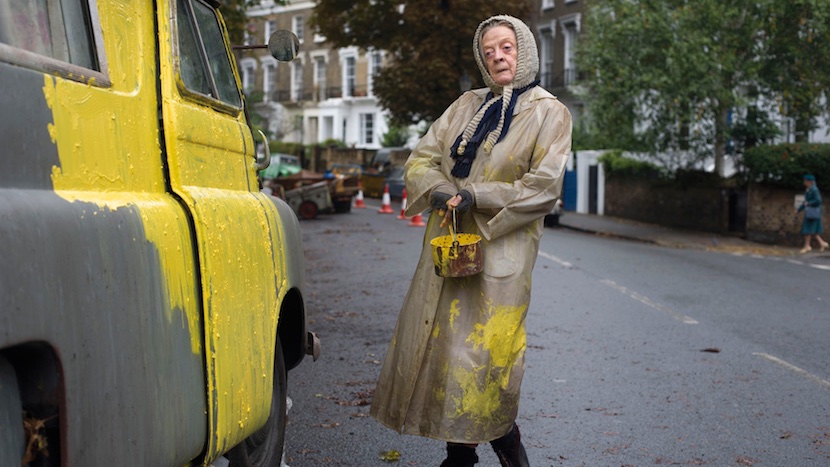The Lady in the Van- Acceptable Ascensions and lenient truths
So back in October I went to see Lady in The Van and chronic at the BFI Film festival which was amazing and today I can finally start posting those reviews (as I didn't want to put spoilers out).
also this review contains SPOILERS
The Lady in the Van is a mostly true story that resonates amazingly, makes you laugh and makes you think because boiled down to its essence it's the story of a homeless elderly woman and the accidentally caring man that by complete and utter circumstance ends up helping her. The story is told in a very clever and quite unique way. Alan Bennett (our main character, our writer and our eyes to which we watch this story unfold) is split into two Alan Bennet's, the one who lives and the one who writes (both expertly played by the amazing Alex Jennings who deserves a plethora of awards). Occasionally the one who writes and the one who lives will stop the story to discuss that maybe they didn't say that or she didn't say that and the one who writes will say it enhances the story to do so.
 |
| Maggie Smith as the Lady in the Van |
It's a exceedingly clever take on the biopic.A genre that tends to get an awful lot of flack for not being accurate and its important to note most of these complaints are for good reason. A lot of the time you can understand why they made the changes as they do enhance the film but the more the story is augmented the more of the truth is lost. This is the case for films like The Imitation Game which seems to lose its self when you compare it to the truth. Lady in the Van bypasses any form of similar criticism by acknowledging it.
But anyway on to the "she" i mentioned earlier. This particular lady was named Mary Shepard (Dame Maggie Smith), a ex nun, brilliant pianist, devout catholic and in her later years became a paranoid scared old lady living in a battered van.
| Alex Jennings as Alan Bennett |
There is a very interesting dichotomy at play in this film definitely focusing on acceptability in society. Alan Bennett is a gay playwright living on his own in a moderately rich area, during the film when he has people over he has them over at night during the day he is introverted mainly just writing. The neighbours and life accepts him as an acceptable part of society. Meanwhile Ms Shepard is unlikeable, rude and loud. But most importantly to the locals she is a homeless lower class women sullying their street. It feels like a very interesting thing to look at especially as this particular feature is generally played the other way round. The old lady being the acceptable member of society and the gay man being the cast off. Whilst this was a true story so not written to be a different take on a tired old idea its still interesting to see this relationship on film.
The relationship between Ms Shepard and Alan Bennett can only be described as fraught. Alan allows her to park her van in the drive for a couple of weeks after she has a scare (Jim Broadbent serving up some super creepy realness) and she stays for 15 years. You can see how that could make things...complicated. The social worker who visits her throughout the film starts visiting him, giving him instructions and treating him as her carer or family member. He refutes the fact that he is anything to do with her or her situation and yet the social worker comes back. The running gag being that overtime he tries to explain the situation the social worker calls him aggressive. It's really quite funny.
The last point I want to make is a running theme throughout the film "ascension". A lot of the film relies on this. The first time Alan meets Ms Shepard they are both staring up at Jesus on the cross outside a church. When she is taken to the care home to have a wash and have some clean clothes, she ascends into the ambulance on the wheelchair lift. Finally of course Alan (the one who writes) gives her the ascension she always dreamed of as at her funeral whilst walking with him she ascends into the sky. It's an excellent and funny ending to a bittersweet yet brilliant story.
And I think thats the thing about this film that makes it so captivating is that it doesn't take the easy route. It's not just a simple adaptation or simple biopic, it's much more than that. It knows its embellishing the truth, it knows the story is sometimes heartbreaking but it never gets bogged down in grief. It stays light, frequently funny and a fitting tribute to both a talented writer and a truly intriguing woman. Plus the fourth wall break at the end is superb.

Comments
Post a Comment